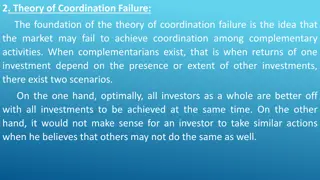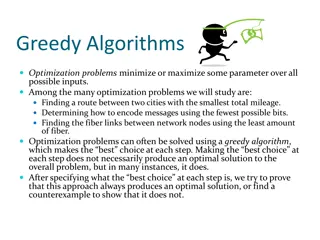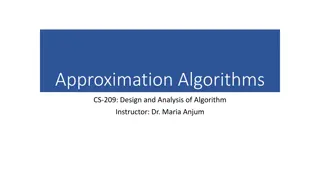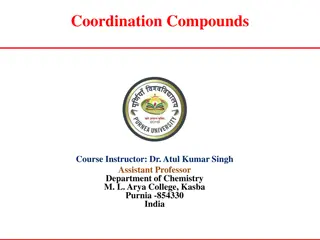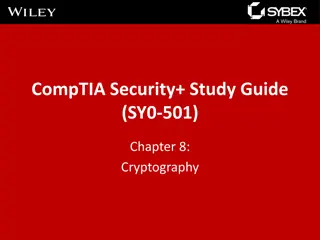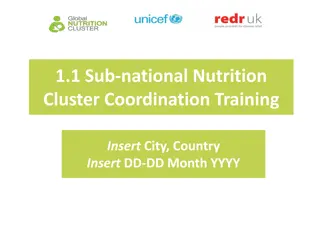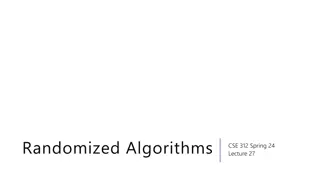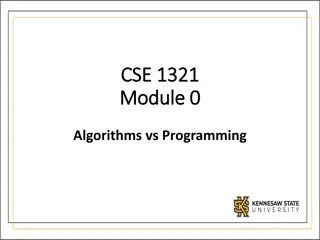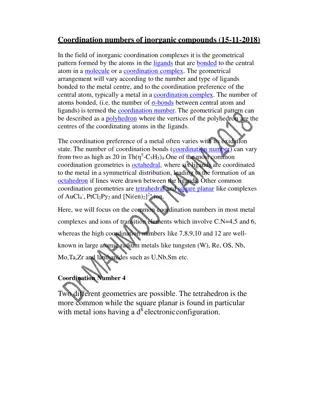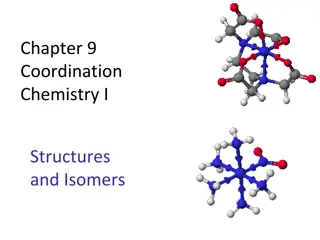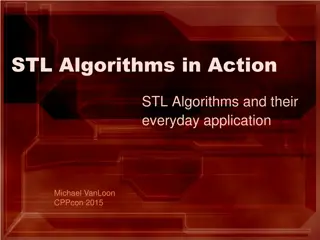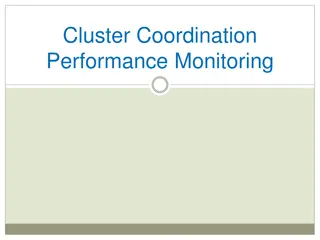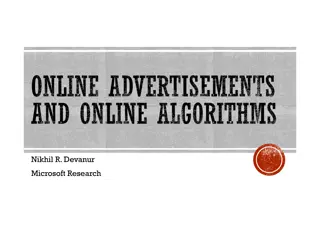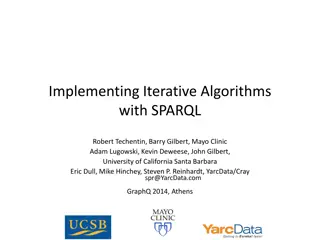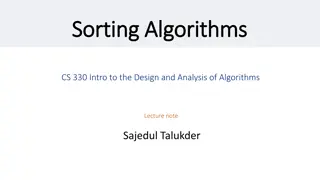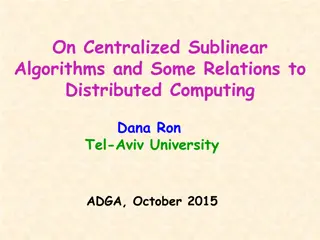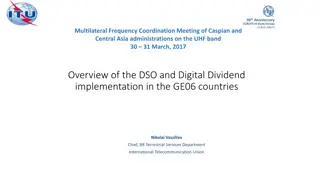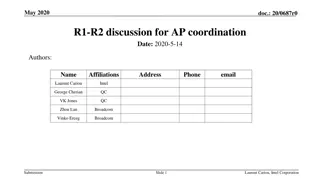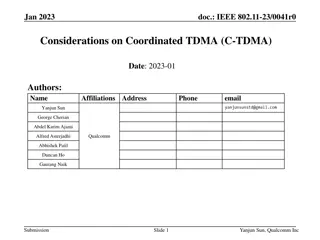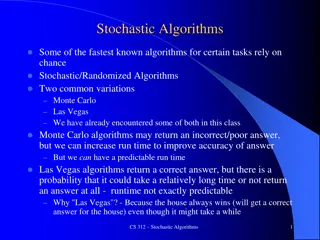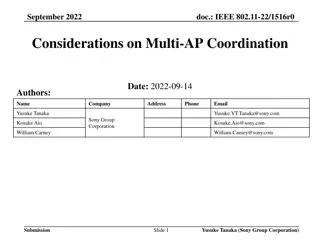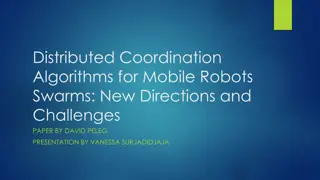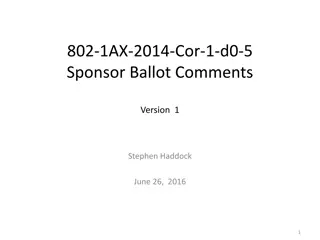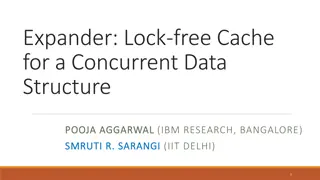Understanding Algorithms and Programming Fundamentals
Learn about algorithms, programming, and abstraction in computing. Explore the definition and properties of algorithms, the relationship between algorithms and programming, and the concept of abstraction. Discover how algorithms are like recipes and how abstraction simplifies complex tasks in comput
1 views • 17 slides
Introduction to Co-ordination Chemistry: Fundamentals and Applications
Explore the fascinating field of coordination chemistry, delving into the complexity of compounds and the coordination bonds that govern their structures. Discover the history, key concepts, and applications of coordination chemistry through a detailed examination of coordination compounds, bonding
13 views • 73 slides
Understanding the Theory of Coordination Failure in Markets
The theory of coordination failure explores how markets may struggle to achieve coordination among complementary activities, leading to suboptimal outcomes. It highlights scenarios where investors' actions depend on each other, emphasizing the role of government intervention to solve coordination is
2 views • 14 slides
Localisation in Child Protection Coordination: A Conceptual Framework
This presentation explores the preliminary conceptual framework and approach for localisation in child protection coordination. It delves into the roles of local actors, coordination systems, governance, decision-making, partnerships, and funding in promoting localisation efforts. The importance of
0 views • 22 slides
Greedy Algorithms in Optimization Problems
Greedy algorithms are efficient approaches for solving optimization problems by making the best choice at each step. This method is applied in various scenarios such as finding optimal routes, encoding messages, and minimizing resource usage. One example is the Greedy Change-Making Algorithm for mak
0 views • 12 slides
Near-Optimal Quantum Algorithms for String Problems - Summary and Insights
Near-Optimal Quantum Algorithms for String Problems by Ce Jin and Shyan Akmal presents groundbreaking research on string problem solutions using quantum algorithms. The study delves into various key topics such as Combinatorial Pattern Matching, Basic String Problems, Quantum Black-box Model, and mo
0 views • 25 slides
Understanding Approximation Algorithms: Types, Terminology, and Performance Ratios
Approximation algorithms aim to find near-optimal solutions for optimization problems, with the performance ratio indicating how close the algorithm's solution is to the optimal solution. The terminology used in approximation algorithms includes P (optimization problem), C (approximation algorithm),
2 views • 10 slides
Understanding Coordination Compounds and Ligands in Chemistry
Coordination compounds involve ligands that donate electron pairs to central metal ions. Ligands can be categorized based on the number of donor atoms they contain, such as mono-, bi-, tri-, tetra-, penta-, and hexadentate ligands. Each type of ligand has the ability to form bonds with the central m
2 views • 15 slides
Overview of Cryptography Techniques and Algorithms
Exploring the diverse realm of cryptography, this chapter delves into both nonmathematical and mathematical encryption methods. It covers substitution and transposition ciphers, steganography, hybrid systems, hashing, symmetric algorithms like DES and AES, as well as asymmetric algorithms utilizing
7 views • 21 slides
Combining Graph Algorithms with Data Structures and Algorithms in CSE 373 by Kasey Champion
In this lecture, Kasey Champion covers a wide range of topics including graph algorithms, data structures, coding projects, and important midterm topics for CSE 373. The lecture emphasizes understanding ADTs, data structures, asymptotic analysis, sorting algorithms, memory management, P vs. NP, heap
0 views • 38 slides
Sub-national Nutrition Cluster Coordination Training Workshop
Welcome to the Sub-national Nutrition Cluster Coordination Training Workshop aimed at sharing key concepts, tools, and approaches for effective coordination of nutrition in emergencies. This training prepares participants for working in Nutrition Cluster/Sector Coordination, promoting dialogue and s
1 views • 10 slides
Understanding Randomized Algorithms: A Deep Dive into Las Vegas and Monte Carlo Algorithms
Randomized algorithms incorporate randomness into computations, with Las Vegas algorithms always providing the correct answer but varying in time, while Monte Carlo algorithms occasionally give wrong answers. Quick Sort is a classic Las Vegas algorithm that involves pivoting elements for sorting. Ch
4 views • 21 slides
Enhancing Care Coordination Through Agreements
Effective care coordination is crucial for ensuring quality referrals and improving patient outcomes. Develop a Care Coordination Agreement to streamline the referral process, reduce waste, and enhance cost-effectiveness in healthcare delivery. This agreement serves as a roadmap for standardizing co
0 views • 49 slides
Understanding Algorithms and Programming: A Visual Introduction
Explore the fundamental concepts of algorithms and programming through visual representations and practical examples. Learn about algorithmic thinking, abstraction, recipe-like algorithms, and the importance of logical steps in accomplishing tasks. Discover how algorithms encapsulate data and instru
1 views • 17 slides
Distributed Algorithms for Leader Election in Anonymous Systems
Distributed algorithms play a crucial role in leader election within anonymous systems where nodes lack unique identifiers. The content discusses the challenges and impossibility results of deterministic leader election in such systems. It explains synchronous and asynchronous distributed algorithms
2 views • 11 slides
Mathematical Analysis of Algorithms in CMPE371 - Fall 2023-2024
Explore the mathematical analysis of algorithms in CMPE371 for Fall 2023-2024, focusing on non-recursive and recursive algorithms. Learn how to analyze non-recursive algorithms by deciding on input size parameters, identifying basic operations, and simplifying summations. Dive into recursive algorit
1 views • 31 slides
Coordination Numbers in Inorganic Compounds: Geometries and Structures
In inorganic coordination complexes, the coordination number refers to the number of atoms bonded to the central atom. Common geometries include octahedral, tetrahedral, and square planar, depending on the type and number of ligands. Transition metal complexes exhibit different coordination numbers
2 views • 8 slides
Understanding Coordination Chemistry: Structures, Isomers, and Naming
Exploring coordination chemistry involves understanding structures, isomers, naming conventions, and common coordination numbers, all essential in studying coordination compounds. Coordination compounds consist of central metals, ligands, and charge balancing ions. Naming involves listing cations, l
0 views • 46 slides
Pseudodeterministic Algorithms and Their Application in Search Problems
Pseudodeterministic algorithms provide a unique approach to the search problem associated with binary relations, offering an error reduction technique while sacrificing the ability to approximate the average value of a function. By introducing m-pseudodeterministic and pseudo-pseudodeterministic alg
1 views • 6 slides
Understanding STL Algorithms: A Practical Guide
Explore the world of STL algorithms through an insightful discussion on the definition of algorithms, the advantages of using STL algorithms over raw loops, and the different classes of STL algorithms available. Discover how these pre-built libraries can enhance your programming efficiency and code
1 views • 99 slides
Exploring the Role of Algorithms in Game Design
Delve into the world of algorithms in game design, from understanding the fundamental concept of algorithms to their pervasive presence in various aspects of gaming, such as military simulations, medical simulations, and gameplay mechanics. Explore how algorithms shape experiences in different types
0 views • 10 slides
Evolutionary Computation and Genetic Algorithms Overview
Explore the world of evolutionary computation and genetic algorithms through a presentation outlining the concepts of genetic algorithms, parallel genetic algorithms, genetic programming, evolution strategies, classifier systems, and evolution programming. Delve into scenarios in the forest where gi
0 views • 51 slides
Understanding Cluster Coordination Performance Monitoring (CCPM)
The Cluster Coordination Performance Monitoring (CCPM) is a self-assessment tool that helps evaluate cluster performance against core functions and Accountability to Affected Populations. It aims to improve coordination and accountability within clusters, developed by the IASC Sub-Working Group. Mon
0 views • 16 slides
Online Advertising and Algorithms: Insights and Simplifications
Explore the world of online advertisements and algorithms through insightful discussions on online advertising, modern developments in online algorithms, and practical optimization strategies like budgeted allocation. Delve into topics such as decision-making under uncertainty, accessing algorithms,
1 views • 22 slides
Implementing Iterative Algorithms with SPARQL
This comprehensive guide explores the implementation of iterative algorithms with SPARQL, focusing on YarcData/Cray's approach to using these algorithms. It covers YarcData's interest in graphs, the Urika appliance, iterative algorithms in machine learning, implementation approach, and algorithms im
1 views • 12 slides
Overview of Sorting Algorithms and Quadratic Sorting - CS 330 Lecture Notes
Sorting algorithms play a crucial role in computer science and computing tasks, consuming a significant portion of computing power. Various algorithms such as Bubble Sort, Selection Sort, and Insertion Sort are discussed for sorting a list of values efficiently. Quadratic sorting algorithms like Sel
0 views • 30 slides
Understanding Coordination Complexes and Transition Metals
Today's lecture covers transition elements, coordination complexes, ligand types, geometries, naming, isomers, and bonding in coordination complexes. Transition metals form coordination complexes with metal ions, ligands, and counter ions. The types of ligands include monodentate and bidentate ligan
0 views • 24 slides
Understanding Sublinear Algorithms and Graph Parameters in Centralized and Distributed Computing
Centralized sublinear algorithms and their relation to distributed computing are explored, emphasizing the efficiency of algorithms in processing large inputs in sublinear time. Examples of sublinear algorithms for various objects are provided, along with the computation and approximation of graph p
1 views • 34 slides
Overview of Multilateral Frequency Coordination Meeting for Digital Dividend Implementation
The Multilateral Frequency Coordination Meeting discussed progress in implementing digital switchover and digital dividend in the GE06 countries. It highlighted the allocation of spectrum for mobile services and the importance of coordinated implementation. Various coordination groups in Region 1 wo
0 views • 14 slides
CS260 Parallel Algorithms: Theory and Practice Review
This review covers essential topics from the CS260 Parallel Algorithms course by Yihan Sun, focusing on key concepts such as scheduler programs, cost models, reduce and scan techniques, PRAM models, atomic primitives, small algorithms, the master theorem, and sorting algorithms like Quicksort and Me
0 views • 25 slides
Enhancing Healthcare Emergency Preparedness and Response in Wisconsin
The Wisconsin Hospital Emergency Preparedness Program (WHEPP) focuses on supporting hospitals in planning and responding to mass casualty incidents and pandemics. It emphasizes the importance of healthcare coalitions, tier coordination, and disaster medical coordination centers. The program, funded
0 views • 30 slides
Proposal for Release 1/R2 Feature Split in Wireless AP Coordination
The proposal suggests modifying the split between Release 1 and Release 2 features for wireless AP coordination in order to address the lack of consensus on the low complexity AP coordination feature. It aims to enhance clarity and efficiency in the development process while maintaining the value of
0 views • 7 slides
Enhancing AP Coordination for Improved Wireless Network Performance
This document discusses considerations for Coordinated TDMA (C-TDMA) in IEEE 802.11 networks to address issues of limited coordination among Access Points (APs). The objective is to enhance coordination among APs to improve network reliability in terms of latency, throughput, and fairness. Design pr
0 views • 14 slides
Exploring Stochastic Algorithms: Monte Carlo and Las Vegas Variations
Stochastic algorithms, including Monte Carlo and Las Vegas variations, leverage randomness to tackle complex tasks efficiently. While Monte Carlo algorithms prioritize speed with some margin of error, Las Vegas algorithms guarantee accuracy but with variable runtime. They play a vital role in primal
0 views • 13 slides
IEEE 802.11-22/1516r0 AP Coordination Considerations
Review of discussions on AP coordination in WNG sessions and EHT SG/TGbe meetings, proposing advancements for future WLAN technology. Emphasis on the importance of prioritizing AP coordination to address various WLAN objectives effectively. Details on AP coordination subtypes and their impact on rel
0 views • 11 slides
Distributed Coordination Algorithms for Robotic Swarms: Challenges and Innovations
Explore the world of robotic swarms through the lens of distributed coordination algorithms. Discover various coordination tasks, synchronization models, and algorithm results, alongside the evolution of robot models for enhanced efficiency. Delve into coordinated movement, flocking behaviors, and t
0 views • 10 slides
Distribution Algorithms in Link Aggregation Groups
In the context of IEEE 802.1ax standard, the distribution algorithms for Link Aggregation Control Protocol (LACP) are explained. The standard allows for flexibility in choosing distribution algorithms, with version 2 enabling explicit coordination. The problem of per-Aggregator distribution algorith
0 views • 15 slides
Understanding Lock-Free and Wait-Free Algorithms in Concurrent Data Structures
Illustration of lock-free and wait-free algorithms compared to blocking algorithms, with insights on concurrent object execution, blocking vs. non-blocking algorithms, definitions, comparisons between locks, lock-free, and wait-free approaches, and explanations on making algorithms wait-free. Exampl
0 views • 23 slides
Enhancing Care Coordination in the Medical Neighborhood
This content emphasizes the importance of ensuring high-value care coordination through effective referral processes and close-loop tracking in the medical neighborhood. It discusses key action steps, such as developing care coordination agreements and providing a high-value referral response. Furth
0 views • 26 slides
Submarine Cable Resiliency Update and Recommendations
Working Group 4A provides updates on the status of submarine cable resiliency, highlighting the risks to infrastructure due to lack of coordination across agencies and clustering of cable routes. The group aims to enhance regulatory coordination and promote geographic diversity to ensure network res
0 views • 7 slides


